- Home
- Greg Keyes
Godzilla vs. Kong Page 3
Godzilla vs. Kong Read online
Page 3
“No,” Nathan said. “The opening—we call it the Vortex—is on land and nearby, but the climactic conditions are rather extreme, so we’ll be monitoring the expedition from this carrier. The exact location is secret, for obvious reasons, which is why we have been jamming any GPS equipment you might have. You will all be allowed on the bridge to watch things as they develop. If you go above deck you won’t see much, but if you do you might want to dress for wet weather. We have a storm coming in.”
* * *
The storm wasn’t coming to them, of course—they were going to it. Nathan watched as the black clouds grew until they blotted out the eastern sky. They came to a stop just outside of the storm’s radius, at Dave’s request.
“We won’t have a problem flying through all that,” he said, waving at the cloud. “But taking off in a full-on thunderstorm—why take the chance.”
“Once you’ve taken off, we’ll ease in closer,” Nathan said. “I want to be as close as possible to the relays.”
“That’s all you,” Dave said. “I’ll feel better knowing you’re watching me.”
* * *
Nathan had compared their endeavor to the space program, with some justice, he thought. And yet it started with considerably less fanfare. There was no countdown, no spectacular lift-off. The three aircraft simply rose up on their under-jets and flew off toward the standing storm. As promised, the ship started forward almost immediately, nudging into the tempest. As sheets of rain swept across the deck, the last of the reporters came onto the bridge.
Dave’s plane had forward-mounted cameras, and what they showed now was nothing but clouds. Nathan knew the pilots had radar and other instruments working for them, but he felt claustrophobic just looking at the screen.
Once he’d been driving in a rainstorm when an eighteen-wheeler passed him and doused his windshield with so much water it took his wipers what seemed like an eternity to clear it. He hadn’t been able to see anything—not the taillights of the cars in front of him, not the shapes of the cars, nothing. If he’d slammed on the brakes, he’d known he might be rear-ended, but how could he keep going when he might smash into a car in front of him at any moment? He had barely managed to control his panic, and that was nothing compared to rocketing along through a superstorm, aiming for a freaking hole in the ground…
He closed his eyes. Come on, Dave.
“Little light precipitation,” Dave’s cheerful voice came over the intercom. If you will look off to our port side—that’s to the left, folks—you’ll be able to see—well, nothing. But if you keep your eyes straight ahead, I think I can promise you—there we go.”
The jungle suddenly appeared, the tallest trees jutting into the clouds, the planes so low to the treetops Nathan found himself involuntarily pushing imaginary brakes on the floor. They were going so fast…
In an instant, the cave mouth was there, a gaping wound in the world.
“In we go!” Dave shouted. “Unto the breach.”
There’s gonna be T-shirts with that on it, Nathan thought. This is going to change everything.
The jets turned on floodlights as they whipped down the tunnel. It was harrowing, but somehow not as bad as the storm. This was more like watching a roller-coaster ride, maybe with a Wild West silver-mine theme. There wasn’t anything to see here that was too far out of the ordinary. Everything weird was much further down the tunnel. Monarch had sent drones in, of course, and the data they had provided had added significantly to his calculations, but there was a point beyond which the signals weren’t strong enough to maintain the sort of contact that made remote piloting possible. That was especially true when they hit the Vortex itself, where gravity appeared to do funny things with time, so outside signals were out of synch with the drones’ experience of reality. Human pilots were necessary.
“Looking good, control,” Dave said. “Outside temperature elevated, but nothing crazy. This looks like a cakewalk.”
“You’re coming up on the Vortex,” Nathan said. “Once you enter, you’ll have to switch to your G-pulse signal for us to stay in touch.”
“Acknowledged, control.”
Nathan watched the feed from the forward cameras. The tunnel tilted down now, not vertical but not that far from it. Up ahead, weird colors scintillated, cutting off visibility of anything beyond.
“Switching to G-pulse,” Dave said. “Going in, brother. See you on the other side.”
The screen went black as the transition happened. Then it flared back on, a chaos of rapidly shifting pixels. He knew the data was now coming in discrete bundles every few seconds, but the receiver should be buffering it, piecing it together, synchronizing the disparate flows of time.
“Dave?” he said. “Do you read me?”
“Copy,” Dave said. “Trippy. Really trippy … could probably sell tickets…” his voice stretched out into a long squeal, then a groan, lowering in pitch until it was inaudible. As if the signal was red-shifting, moving away from him at incredible speed. How fast were they going? No telemetry was coming through.
“Shit,” he muttered under his breath. “Shit.”
This was not supposed to happen. He’d missed something. Yes, he had expected acceleration, but not nearly to this order of magnitude. He had told the reporters it would be like going into a jetstream; this seemed more like a railgun.
“Dave,” he said. “If you can hear me, abort. Abort now. Put on every brake you have and come back.”
He listened desperately for an answer, but none came.
No, no, no, no…
It should still be all right. When they came out the other end of this, they should have space to slow down, right? If it was like he thought, there should be dozens of miles of open space in front of them, hundreds maybe. A world-sized cavern.
It was going to be all right. It was…
Abruptly everything was back—telemetry, sound, the forward cameras. He had a glimpse of open space, a curved horizon, a storm or something, in the distance, coming closer with incredible speed.
“Wow,” Dave said. “That was intense. But we’re—”
Then everything went black. Nothing.
“Dave!” he shouted. “Dave!” He switched frequencies, tried again. Nothing from any of the planes. It was as if they had simply ceased to exist.
Trying not to panic, he pulled up the last image, the last set of data. The picture showed nothing but what might be a thunderhead with lightning shining from its core. Mountains in the distance, upside down. He scrolled through the other readings until he got to the readout of speed, velocity—deceleration. He went back over it again, desperate to believe it was wrong. That he had read it wrong.
“Dave,” he said. “Oh, God, Dave.”
THREE
They believe, in all this country, that there is a kind of gorilla—known to the initiated by certain signs, but chiefly by being of extraordinary size… Such gorillas, the natives believe can never be caught or killed; and also, they have much more shrewdness and sense than the common animal. In fact, in these “possessed” beasts it would seem that the intelligence of man is united with the strength and ferocity of the beast.
From Explorations and Adventures in Equatorial
Africa, Paul B. Du Chaillu, 1861
Skull Island Eleven Months Ago
White light scorched across the dark heavens, leaving a jagged streak of red behind Jia’s eyelids as she blinked them shut against the pouring rain. An instant later, she felt the shiver the light made in the earth and air. The water sucked at her ankles, climbing higher toward her calves. She clung to Sister-Mother’s hand, felt the calluses there, the strength that kept her going, the grip that forced down her terror. Everything was wrong, and she knew it. She did not know the wind speech of her people, and they rarely used it anyway. But she knew it by their expressions, by the way they held their hands, the set of their shoulders, tilt of their hips when they paused, struggling through the jungle.
She knew that the
y expected to leave the world soon, to join the bundles of their generations in the What-Always-Is.
The blue-white light came again and again, incandescent serpents coiling in the sky and striking down toward the earth. She could smell the breath of the rainsnakes—like copper, like blood and yet not quite like either. And she could smell salt in the rising waters of the stream. She liked the scent of the ocean; she remembered long days overlooking the Eternal Waters that surrounded the Land-World, staring across the waves. Back then the black sky and lightning snakes had been out there, surrounding the Land-World. Protecting it, the elders said. Keeping the great enemy at a distance. But now the salt water had come ashore, and the black sky covered the island, and the once-gentle winds had become malevolent spirits, breaking the trees, pushing waves across the lowlands, scouring the highlands. And the things from Below-The-Land, those dark recesses where the bad things came from—they were rising, too. Things were stirring, the elders said, things were mixing that ought to remain separate. The Iwi counted time in bundles of generations, each a bundle of four. And they counted back many thousands of bundles to the start of things, when the Iwi and animals were the same, before they crawled out of the moist earth and became what they were now.
Perhaps because the Iwi tradition was so ancient, they were slow to react. Many of her kin were already gone, buried beneath a mudslide. The village of her birth was now sunken beneath roiling waters. The ancient wall that kept out the predators was filled with debris and became a dam, holding the waters in as they had once kept the enemies out. And now she and a handful of her kin were fleeing toward the high ground of Hanging-Fish-Calls-There, where some said the caves could offer them shelter, shallow as they were, with no deep trails to the Below-The-Land and its dangerous inhabitants.
Now the water was to her knees, and she did not yet see the skyward-yearning earth that led up to the high country. They were still among the ferns and rushes and Make-A-Fist trees that formed intertwined thickets too dense to travel through.
She felt her own heart beating, quick, like a bee. She felt the pulse of Sister-Mother’s fear in her fingers.
And she felt something else, in the water.
She stopped, squeezing Sister-Mother’s hand, then pointing behind them, where a cluster of trees and bushes drifted in the rising waters.
Koru lifted his spear, and Hiu, too, but they might as well have been wielding twigs. The huge jaws opened, filled with teeth: the Sirenjaw clamped down, and now they were four fingers of kin rather than a handful-and-one.
Sister-Mother lifted her bodily and began to run through the water as best she could. Without her feet in the water, Jia could no longer tell what was happening behind her. She tried to look over Sister-Mother’s shoulder, but the rain was now so hard it felt like a shower of stones, and it was cold. Jia began to shiver. She felt Sister-Mother’s breath, so hard it felt like something tearing inside of her, and she squirmed, trying to get down.
Finally Sister-Mother did put her down, and to her surprise, she felt not water, but soil beneath her feet. It was wet with rain, but she smelled moss now, and the rain-bruised leaves of needleleaf, which only grew on high ground.
She looked up at Sister-Mother, who flashed her a smile-that-wasn’t-really-a-smile, but Jia smiled back, a sign of her trust.
There was no one else behind them, Jia saw. Two fingers of kin, now.
They twisted their way through the trees and across rocky meadows. Normally at this time of year, Jia remembered, these open places would be blood red with Ichor Blossoms, and the wind full of their rotting-meat smell, which attracted flies and more noisome insects and even leafwings, supplementing their diets with the liquor of half-digested insects that the funnel-shaped blossoms contained. The Iwi came here to hunt the creatures for their wings. The smell was here, fouler than ever, but the flowers were black and rotten, destroyed by months of rain.
She felt another turning in the earth below her. A trembling, growing stronger, nearer.
Sister-Mother knew it, too. She could probably feel it in the air, with her ears, as Jia could not. Once again, she grabbed her hand, pulling her along, no longer running uphill, but parallel to the gradual slope.
And then, suddenly, in a moment, Sister-Mother grabbed Jia around the waist and lifted her up, pushing her into the closely spaced, sturdy limbs of a Friend Tree. Confused, Jia, looked down at her, saw the smile-that-wasn’t-a-smile, the farewell in Sister-Mother’s eyes.
Then a wave of water swept down from the high ground and took her away. Jia glimpsed her hand reaching for a branch. Then nothing.
The tree shook, despite its thick trunk and deep roots. Panting, her mind bright with fear, Jia climbed up, this branch to the next. But the water was still coming for her. Too soon, she reached the most slender, upper branches of the tree, which bent beneath her weight.
She realized she was staring at her knuckles, pale from her death grip on the tree, at the water rising up the trunk from below, and at nothing else. How tiny her world had become.
So she turned her gaze out and was astonished.
The black clouds piled against the mountains, full of light, glowing red and purple with inner fire. The water cascading down from hills, the birth of a new river, however short its life might be. The trees all bent one way, as if bowing in worship to an unseen spirit in the deep distance. The furious rush of the wind itself. It was terrible, and frightening and beautiful. That was everything about her home at once. There was no mercy in the water, the winds, the clouds, but there was no hatred either. No animosity.
She wondered, not for the first time, if what she saw and felt would be more beautiful if she could do the thing with her ears that other people did; if the “talking air” would tell her something she was missing. She would never know.
She glanced back down. She was still afraid, of course, but her fear seemed a little more distant. She wondered what it would be like to see her ancestors.
The tree shook in a way it had not before. Not from the wind, not from the rising water, but from something else. Something familiar, comforting, but at the same time so much bigger than her.
As the water touched her feet, she saw him, in the distance, coming her way. She waved, she shook the branches of the tree, watching as he waded through the flood. He did not see her, she knew; she was too tiny. His head was almost in the clouds, and his eyes were searching for something far distant, like the bending trees.
She closed her eyes. She knew the words to his hymns, although she could not say them. In her mind, they had their own shapes, taken from the lips of her kin, from their gestures, their expressions. She began to move her hands, to make those shapes.
Though you pass me by, O Kong, we are kin. Though you are great and I am small, we are one. Remember me, if only as a leaf fluttering in the wind.
Then she felt a warm wind on her face and opened her eyes.
He was there, his face filling her entire universe, his eyes, almost as big as her, full of concern. Below her, his hand rose up until it was level with her, within her reach.
He waited. It was her choice.
And it was no choice at all. Her most ancient kinsman, her god, had come for her. What could she do but accept?
She climbed into the huge cup of his hand. He closed it partway, shutting out the worst of the wind and the rain. And then, like a mountain walking he started off. And Jia was relieved, and she was sad, and she knew everything about her world was changed, and would never be the same again.
In His Sanctuary, Present Day
He remembered the glimpse of a tiny creature, one of his, reaching to touch him, the obliterating light that followed. Renewed, he had risen, and fought, and triumphed. He proclaimed himself and the others bowed to him. But no war is won so easily. He knew this from his own memories, but also from other recollections that came to him from a far deeper place, from the darkness before his eyes first opened. They were not the same recollections as those he had experience
d himself; there were no colors or remembered shapes or even places, but instead a deep certainty. As his senses stretched to encompass the wind that blew from the heart of the planet and encircled the world above to meet the winds from the sun, as he could feel the slow rivers of molten rock flowing, colliding, swallowing land, giving birth to it, the cycle of hot rise and cold fall in the waters, the pumping heart of the oceans, everything that was now, so too did he feel what was, when the surface of the earth was liquid rock, when waters came, when ice covered everything, when the green life came and clawed its way onto bare rock. When many of his kind lived, fighting always, and the New Ones came to try to claim dominance.
He had settled the latest war. And then he had sought his own place to rest. But the same light that had given him the energy to fight had also destroyed that place. So he searched for another, and found it, wrestling it from a terrible adversary. He called the others to their places of rest. And there, in the warmth, in the hollow bones of the earth, he had rested his weary, battered body, knowing that eventually the planet would call him back. He drifted into the half-dream, where present and past were the same.
Time passed, no more than a single blink of his eye, it seemed. Then came an itch, a taste on the back of his tongue. Familiar but not familiar. Out of place and wrong. He tried to ignore it at first, because it seemed so insignificant; a tiny parasite trying to burrow into his scales.
But it grew, and as it grew, so did his anger. They should not dare. They should know better.
He broke from the half-sleep, his dreaming ended. He reached out to the other Titans, those woken by Ghidorah and all of the others, too. They were all still where they were supposed to be, quiet, at rest.
All but one; one that should be there but was not.
He pulled himself up. The time for rest was done. His gaze rested on the gigantic skull of the enemy, the ancient adversary his kind had once driven from this place but never completely defeated. He shrieked his warning, his threat, his growing rage.

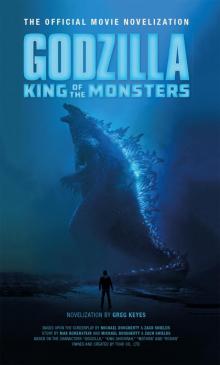 Godzilla
Godzilla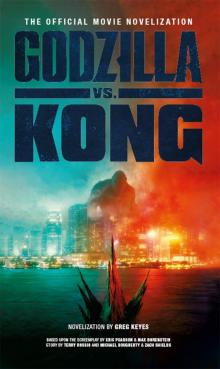 Godzilla vs. Kong
Godzilla vs. Kong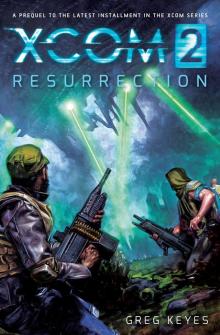 XCOM 2- Resurrection
XCOM 2- Resurrection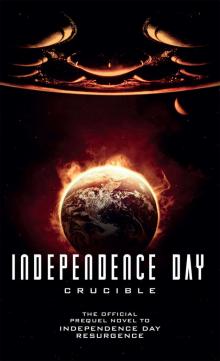 Independence Day: Crucible (The Official Prequel)
Independence Day: Crucible (The Official Prequel)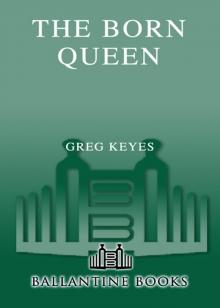 The Born Queen
The Born Queen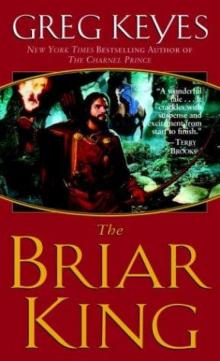 The Briar King
The Briar King Star Wars The New Jedi Order - Dark Journey - Book 10
Star Wars The New Jedi Order - Dark Journey - Book 10 Star Wars: New Jedi Order Book 8b: Emissary of the Void
Star Wars: New Jedi Order Book 8b: Emissary of the Void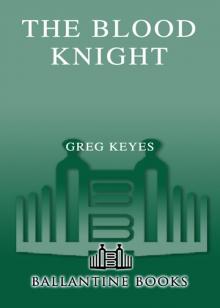 The Blood Knight
The Blood Knight Star Wars - Edge of Victory - Book 1: Conquest
Star Wars - Edge of Victory - Book 1: Conquest Edge of Victory 2 Rebirth
Edge of Victory 2 Rebirth Lord of Souls: An Elder Scrolls Novel
Lord of Souls: An Elder Scrolls Novel The Born Queen tkotab-4
The Born Queen tkotab-4 Rebirth: Edge of Victory II
Rebirth: Edge of Victory II Conquest: Edge of Victory I
Conquest: Edge of Victory I Emissary of the Void
Emissary of the Void The Blackgod
The Blackgod Star Wars The New Jedi Order - The Final Prophecy - Book 19
Star Wars The New Jedi Order - The Final Prophecy - Book 19 The Infernal City
The Infernal City The Charnel Prince
The Charnel Prince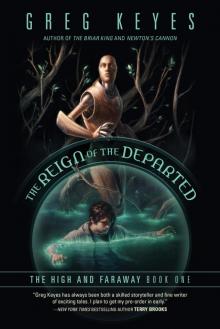 The Reign of the Departed
The Reign of the Departed Lord of Souls es-2
Lord of Souls es-2 Chosen of the Changeling
Chosen of the Changeling Dawn of the Planet of the Apes
Dawn of the Planet of the Apes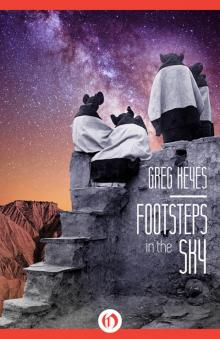 Footsteps in the Sky
Footsteps in the Sky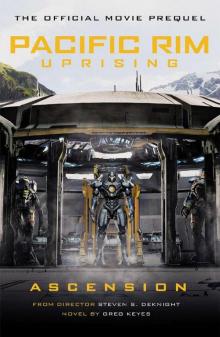 PACIFIC RIM UPRISING ASCENSION
PACIFIC RIM UPRISING ASCENSION The Final Prophecy: Edge of Victory III
The Final Prophecy: Edge of Victory III